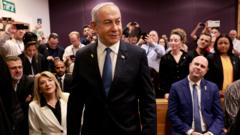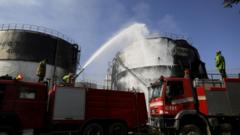Today, Prime Minister Benjamin Netanyahu made history as the first sitting Israeli leader to testify in a criminal trial, defending himself against multiple corruption charges including bribery, fraud, and breach of trust, amidst an ongoing military conflict in Gaza. During his testimony, he labeled the allegations as politically motivated, asserting his innocence while highlighting his resilience in leading the country through a tumultuous period.
Netanyahu Denies Corruption Charges Amid Ongoing Gaza War

Netanyahu Denies Corruption Charges Amid Ongoing Gaza War
Israeli Prime Minister Benjamin Netanyahu takes the stand in his corruption trial, calling charges 'absurd' while navigating conflicts abroad.
In a historic courtroom appearance, Israeli Prime Minister Benjamin Netanyahu passionately defended himself against serious corruption charges, denouncing them as part of a political vendetta. On the witness stand, Netanyahu emphasized the absurdity of the allegations while managing national security crises, including ongoing warfare in Gaza and tensions with Syria. His defense team argued that prosecutors were intent on discrediting him rather than investigating valid crimes.
Netanyahu's testimony took place in an underground courtroom in Tel Aviv, with the proceedings drawing attention both for their gravity and the supportive presence of prominent government officials. The Prime Minister’s defense outlined that allegations of accepting gifts in exchange for favorable media treatment were baseless, portraying him as a victim of a biased system.
As the trial unfolds amid intense geopolitical challenges, it raises questions about the intersection of law and politics in Israel, with opinions among citizens sharply divided. Supporters rally behind Netanyahu, emphasizing his leadership skills in a time of conflict, while critics see his legal issues as emblematic of deeper systemic problems in governance.
The trial, which could last for more than a year, is expected to amplify existing divisions and may influence public perspective as Netanyahu juggles his legal battles and the ongoing war. With this case closely watched both domestically and internationally, the implications for Israel's political landscape remain profound.
Netanyahu's testimony took place in an underground courtroom in Tel Aviv, with the proceedings drawing attention both for their gravity and the supportive presence of prominent government officials. The Prime Minister’s defense outlined that allegations of accepting gifts in exchange for favorable media treatment were baseless, portraying him as a victim of a biased system.
As the trial unfolds amid intense geopolitical challenges, it raises questions about the intersection of law and politics in Israel, with opinions among citizens sharply divided. Supporters rally behind Netanyahu, emphasizing his leadership skills in a time of conflict, while critics see his legal issues as emblematic of deeper systemic problems in governance.
The trial, which could last for more than a year, is expected to amplify existing divisions and may influence public perspective as Netanyahu juggles his legal battles and the ongoing war. With this case closely watched both domestically and internationally, the implications for Israel's political landscape remain profound.



















